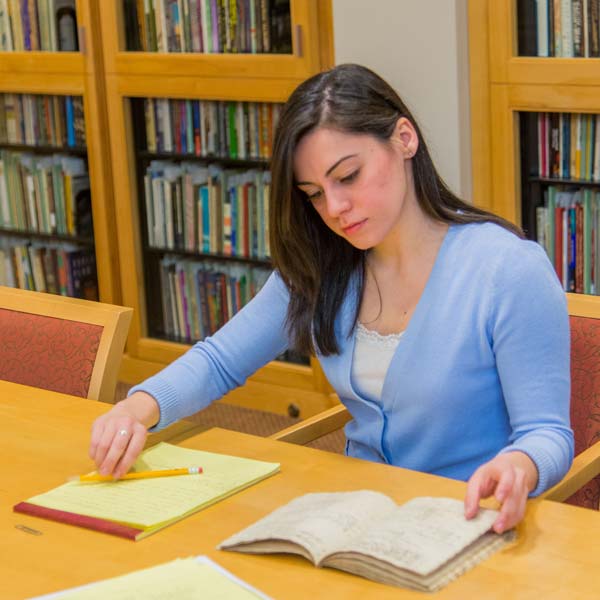Interpreting the Past
by Kristen Vitale '15
As a history student at Nazareth College, I have been trained in the methodologies and obligatory responsibilities of the historian. One of the most palpable and crucial aspects of being a historian is studying and analyzing the primary source documents of the past. For a graduating history major, such as myself, the chance to work with these sources in their original form is the opportunity of a lifetime. I have had the opportunity to do precisely that in my internship at the University of Rochester’s River Campus Libraries, Department of Rare Books, Special Collections, and Preservation.
My task was to transcribe, translate, and research various historic manuscripts from the Medieval and Early Modern Manuscripts Collection. The documents I worked with ranged from single papers and booklets to bills and Bible leaves. One of my personal favorite projects that I translated and researched was a Papal Bull, written by Pope Celestine III, which is a special text that is only issued by the Pope himself. I also really enjoyed researching a manuscript booklet that is suspected to be a Biblical Florilegium, which is an anthology of biblically referenced texts put together to form a collection of bible passages. All of these documents are written in Latin, Old English, French, and Italian.
During this internship, I composed eight manuscripts into a special collection of work that I translated, transcribed, and researched. Indeed, the collection I composed is titled From Medieval to Early Modern: The Contextual Integration and Stylistic Progression of Manuscripts throughout Time, and it arranges these eight manuscripts in chronological order, each representing the stylistic advancements of their representative historical time periods. My work was on display in the University of Rochester’s Department of Rare Books, Special Collections, and Preservation. It was interesting and quite stunning to realize that it was my job to serve as the primary interpreter of these documents; it was my job to transform them into accounts that can be used for the general public.
When starting the internship, I expected to simply improve my historical research skills. However, after eight weeks, I gained much more than that. On a professional level, I obtained experience working with historical documents in a library setting. I refined my foreign language skills and added to my understanding of what it means to be a professional historian. On a personal level, I was awed by the magnitude of what these texts represented. I touched documents touched by figures I’ve learned about from centuries past; I read what they wrote with their own hand. I literally touched a piece of history. It is as if I now have a personal connection to these historical figures whom I researched; now part of their history is in my hands.
For a student aspiring to a career as a professional historian, this internship was an incredible opportunity. When it ended, I left with the experiences and realizations of a true manuscript researcher. I got the initial experience of researching, transcribing, and translating manuscripts as well as working on all the intricate parts that get into creating work for display. I got experience in an archival/library setting as well. It is my personal dream to continue to be in this world of historical research, whether that be in archival work, manuscript research work, or perhaps in a different field. I know that this opportunity gave me the experience I need to further break into the world of historical discovery.
Kristen Vitale ’15 graduated in May 2015 with a degree in history.

Intern Kristen Vitale '15 cataloged rare manuscripts for the University of Rochester libraries.